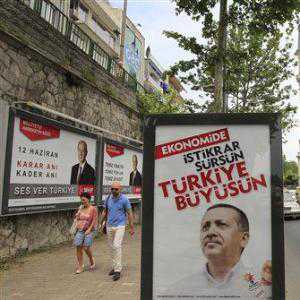
Turkey goes to the polls this Sunday, with Prime Minister Recep Tayyip Erdogan’s Islamic-rooted Justice and Development Party (AK) fighting on its record of a decade of unprecedented economic growth. Its main adversary, the secular Republican People’s Party (CHP), is seeking to reinvent itself on a platform stressing that with growth has come increasing authoritarianism. For both parties, the support of younger voters will be crucial, with a third of the electorate under 25 years old. .
The campaign song of the ruling Justice and Development Party blasts out on the streets of the Besiktas district of Istanbul. The party is standing on its impressive record of nearly uninterrupted economic growth since it came to power in 2002, turning the country from the “sick man of Europe” into an economic tiger.
Giving out campaign literature is university student Ayse Demir. She says it is that transformation that has drawn her to the party.
Watch related Henry Ridgwell video report
“About 10 years ago, all the people were saying we had to join the European Union,” she said. “But now, I don’t think so. Because we can be power without European Union. For example, the Middle East; now all the Middle East countries want to as Turkey it’s important.”
Prime Minister Recep Tayyip Erdogan has announced a host of huge infrastructure projects – roads, hospitals and even new cities. His platform is very different from the last general election, when he emphasized his democratic credentials in facing down Turkey’s then-powerful army over its opposition to his choice for president. Now he faces the main opposition Republican People’s Party.
A CHP campaign TV advertisement is aimed at the youth vote. It stresses the party’s policies for women and ethnic minorities. It also warns of the dangers of what it calls the government’s growing authoritarian rule, citing increasing censorship of the Internet and state surveillance of telephones. The party, under the new leadership of Kemal Kilicdaroglu, is seeking to reinvent itself as a modern social democratic party and discard its staid pro-statist image.
At CHP campaign headquarters in Istanbul, party supporters claim its transformation is being rewarded. They say there has been a 10-fold increase in youth volunteers. One of them is law student Melis Ayanit.
“We needed a change, a new political ideology and this change came with Mr Kilicdaroglu. The people changed, now we have more young people in the party.” Ayanit said. “The young people saw the power of the first party. We are threatened. We are really threatened. For example, I don’t want to talk on mobile phone with my friend for political subjects. Because I am afraid, because someone can hear me.”
According to opinion polls, CHP is set to increase its support by as much 50 percent from the last election. But with Turkey’s economy growing at nearly nine percent, the same polls are predicting that the prime minister should still win a comfortable majority. The size of that majority is considered of crucial importance.
The prime minister has set a target of a two-thirds parliamentary majority, which will enable him to introduce constitutional reform. Sabiha Senyucel Gundoga of the Istanbul-based think tank Tesev says whether Mr. Erdogan achieves that goal will dictate in what direction the country is heading.
“Having the number of votes of 367 gives them big, big opportunity to make any changes that they want,” Gundoga said. “If there is a constitution with a consensus, everyone is satisfied to certain extent. Otherwise if there are tensions in that political climate, the polarization will be much more tense.”
While there is little excitement about the question of who will win, there is growing expectation – if not concern – over the margin of victory in this Sunday’s poll.
via Two Major Parties Fight for Votes in Turkey Election | Europe | English.